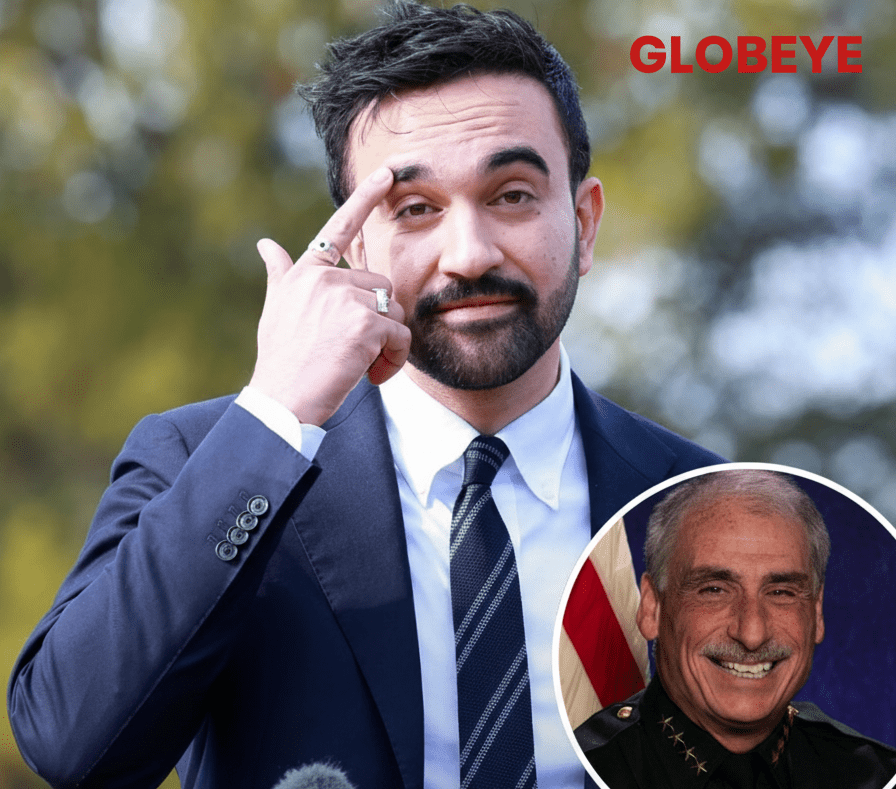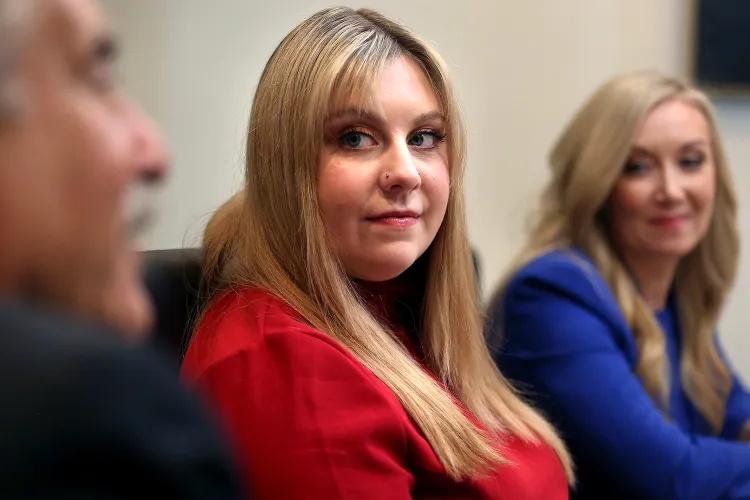Florida Sheriff Invites New York Families to Relocate After Zohran Mamdani’s Socialist Victory — “Start a New Life Here”
The shock waves sent by the mayoral victory of Zohran Mamdani in New York City didn’t just echo through City Hall. They rippled into suburban dinners and Florida coastal counties, where one law-enforcement official made a bold invitation: for New Yorkers who are unsettled by the direction of the city under Mamdani’s leadership, a fresh start in Florida awaits. Mike Chitwood, sheriff of Volusia County, publicly extended the offer just hours after the election results were announced. “If you’re uncomfortable with what’s ahead in New York,” he posted on social media, “come join us in Volusia County. A new life starts here.”
Chitwood’s message landed amid broader signs of anxiety in New York. Within minutes of the announcement that Mamdani had won, school consultants and placement advisors reported an uptick in local families requesting transfers to private schools outside the city. One consultant told The Post he received more than twenty calls just after the news. For many respondents, the concern wasn’t tuition or commute times but a deeper unease about how the city’s new political leadership might reshape daily life, schools and public safety.

Volusia County’s offer is striking for its directness. Chitwood specifically reached out to NYPD officers feeling unsupported in the city and to families concerned about safety, educational stability and quality of life. “To my NYPD friends,” he wrote, “if you want to work where you’re appreciated by the community and supported by elected officials, check us out.” He painted Volusia as a growing region where public safety is reinforced, schools are safe and the standard of living is rising — implicitly contrasting that picture with the uncertainty some New York families now feel.
The timing of the invitation underscores how pivotal the 2025 New York mayoral contest was seen to be by many observers. Mamdani, a self-described democratic socialist, ran on a platform of sweeping change — promising policies such as fare-free transit, rent freezes and deep structural transformation of city services. Critics argue that such promises raise serious questions about where funding will come from. Supporters say the vision addresses long-term inequities. For many New York residents, though, the result has prompted serious second thoughts about staying put.
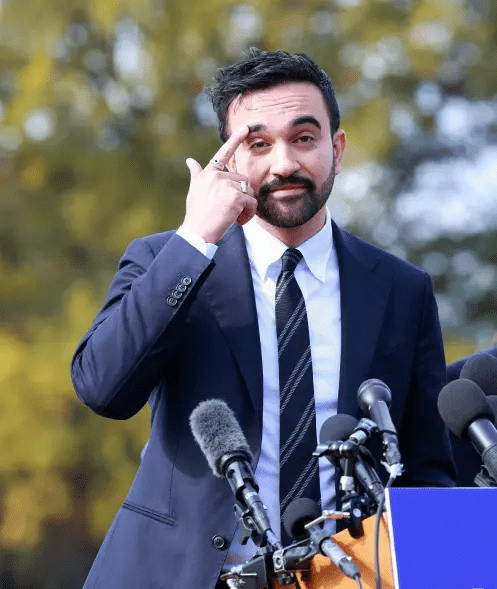
Data reinforces this concern. Volumes of relocation inquiries surged. One survey quoted in the media found that about 9 percent of New Yorkers said they would “definitely” leave if Mamdani won, and 25 percent said they were considering it. Salt-water migration from New York to Florida had already been increasing. Between 2018 and 2022, more than 125,000 people relocated from New York to Florida, carrying out approximately $1.4 billion in income in the process. The environment of this mayoral race appears to have amplified that movement.
For some Florida residents, the open invitation sparked discomfort and the sense of a pending influx. “We have no more room here, literally,” one Volusia citizen wrote in response to Chitwood’s social-media message. Another warned, “Don’t New York my Florida.” The cultural push-and-pull is visible, but so too is the broader dynamic: families seeking stable communities, predictable schools and supportive infrastructures are reacting in real time to cities’ political shifts.
On the ground, private-school placement consultants say inquiries from New York families are not just fleeting. They are serious. One advisor noted that elite private schools in Connecticut, New Jersey and Florida are being asked for admission help by Manhattan families planning early exits. These same families cited concerns about safety, cost of living, tax burdens and a city’s future direction under new leadership. For many, Mamdani’s win functioned as the final trigger — the political moment that transformed speculation into action.
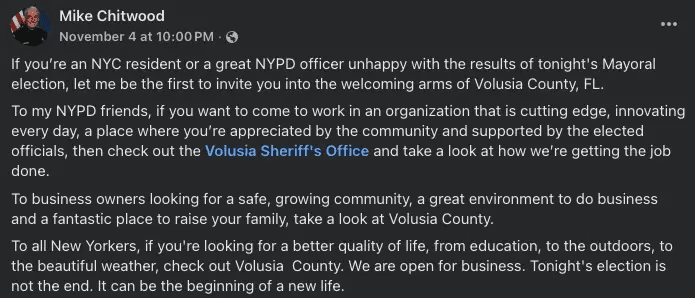
What remains to be seen is how many of these inquiries convert into actual moves. Securing a spot at a competing private school is notably harder outside New York in some cases. Schools in Florida and Connecticut that have begun fielding withdrawals and new applications from Manhattan families are now facing more competition than usual for admission. One consultant predicted the process will be “far, far, far harder” than many families expect.
Meanwhile, the larger political message is clear. For urban conservative or moderate families who feel squeezed by rising taxes, changes in education policy or public-safety concerns, the manifested choice to relocate represents both protest and preference. On the flip side, for progressive leadership like Mamdani’s, the challenge will be demonstrating that the dramatic shift in governance isn’t driving an exodus of those with means — because for many urban economies, out-migration of affluent families can affect tax bases, school enrollment and property values.
Mamdani’s campaign itself was built on transformative rhetoric. He ran as a candidate unapologetic about his socialism, pledged to roll out policies like free mass transit and guaranteed basic housing rights, and openly criticized major institutions. Those commitments excited many voters who felt left behind in the city’s old economy. Yet for others, especially those whose children attend private schools, whose homes bear high property costs and whose sense of daily safety is paramount, the ideology raised uncertainty rather than inspiration.
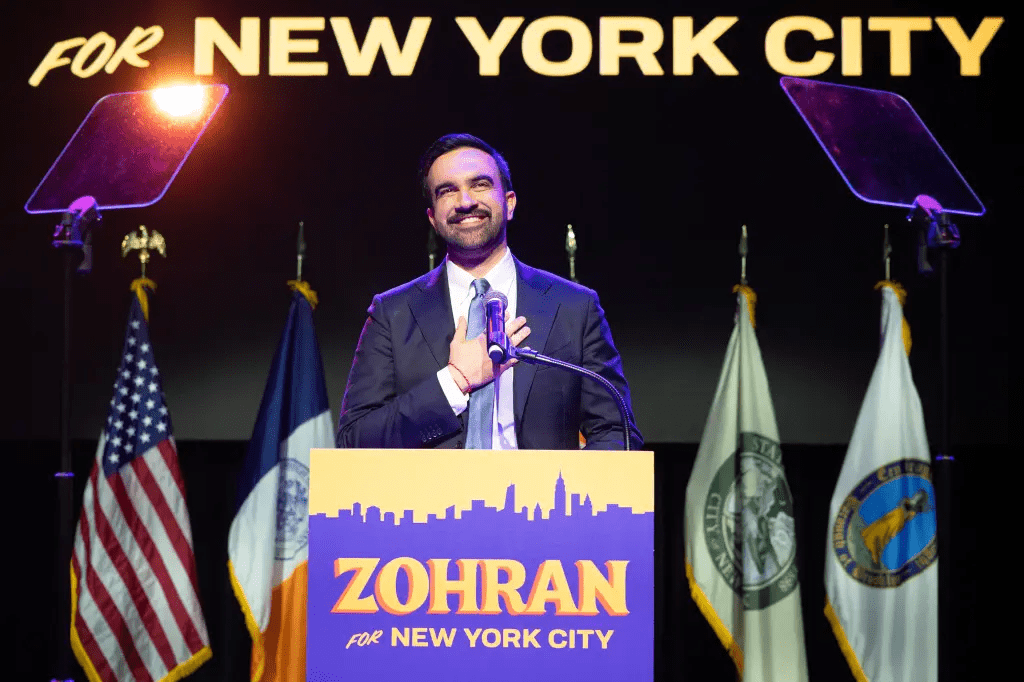
Whether Chancellor of Schools, housing commissioner or city council member, many of the city’s leadership teams now know that the transition will not simply be a policy hand-over. If families begin to relocate en masse, the demographics of New York City may shift. That’s significant not just for neighborhood politics but for statewide and national projection of the city’s vitality. Real-estate brokers in Florida and Connecticut have already reported upticks in Manhattan families scanning listings, buying second homes and monitoring admission calendars.
At the same time, the open invitation from Volusia County creates a broader narrative: that local officials outside major cities are reading the political tea leaves of urban America. They are positioning their jurisdictions as escape valves for families dislocated not just by cost, but by political and cultural change. That movement itself may become part of the national conversation as the next election cycles approach.
For Mamdani, the emerging relocation trend presents a test of leadership. If large numbers of families leave, it could undermine the tax base and school enrollment of the city he now leads. The city’s finances, housing markets and public-school system are deeply interlinked. Conversely, if the city retains its population and rebounds with new policy momentum, Mamdani could show that urban transformation can coexist with thriving communities.
Across the board, this moment is emblematic of greater patterns: where political wins prompt immediate life-style reconsiderations; where urban governance is inseparable from where people choose to live, send their kids to school and build their futures. A mayoral outcome became a catalyst for migration decisions — an unusual but now visible effect of local politics on personal lives.

The story is still unfolding. Will those who dialed up advisors, placed loans and scheduled school tours actually depart? Will Florida or Connecticut private-school admission offices become the staging grounds for stress-tested Manhattan families? Will New York adjust under Mamdani’s leadership in ways that reassure those nervous about departure, or will the exodus deepen? These questions will matter not just to city hall but to millions across the region who weigh politics, stability and opportunity as one seamless calculation.
As families contemplate their next move, the choices reflect more than just local schooling and lifestyle. They reflect the intersection of identity, policy and place. One lobby-group executive told The Post: “We’re not just worried about school anymore. We’re worried about what happens next.” For New York’s wealthy, mobile, and politically sensitive families, the decision to stay or leave may be as much about governance as geography.
On election night, when the results became clear and newsrooms switched from celebration to coverage, the human impact began quietly elsewhere: children packing bags, listings in suburbia going live, call centers buzzing at out-of-state school systems. Politics at the highest-visibility city office just triggered decisions in low-rise suburbs across three states. The agenda of a mayor turned into a migration moment for families.
In that sense, this story is more than a relocation trend. It is a mirror of how politics and personal lives converge. It is about how winning an election is only the beginning of governing reality—and how losing confidence in that start can prompt movement that changes entire zip codes. The slogan of “beginning of a new life,” which began with an invitation from a Florida sheriff, is both literal and metaphorical. For some New York families, the mayoral race wasn’t just about who would govern. It was about where they would raise their children.
